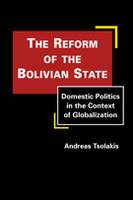
Andreas Tsolakis
The Reform of the Bolivian State
Domestic Politics in the Context of Globalization
Lynne Rienner Publishers
2010
2010
In 2005, two decades after President Victor Paz Estenssoro's New Economic Policy heralded the beginning of a profound transformation for Bolivia, violence had become endemic in the country, economic growth was weak, and political corruption was flourishing. Evo Morales was elected to the presidency in a climate of intense social conflict and disorder, promising to deconstruct the entire political and economic edifice so painfully built since 1985. Andreas Tsolakis investigates Bolivia’s trajectory since 1985 in the context of the country’s deepening integration into the world market.
From a historical materialist perspective, Tsolakis assesses why neoliberal restructuring efforts failed, as well as the implications of the continuing internationalization of the Bolivian state for Morales's reform program and his foreign relations in Latin America and beyond. He provides both a nuanced analysis of collaborative practices among transnational social forces and an up-to-date, critical analysis of the Morales administration
Andreas Tsolakis is a postdoctoral fellow in the Institute of Advanced Study at the University of Warwick and an analyst at the Fundación Secretariado Gitano in Madrid.
+ Le laboratoire politique bolivien par Franck Poupeau